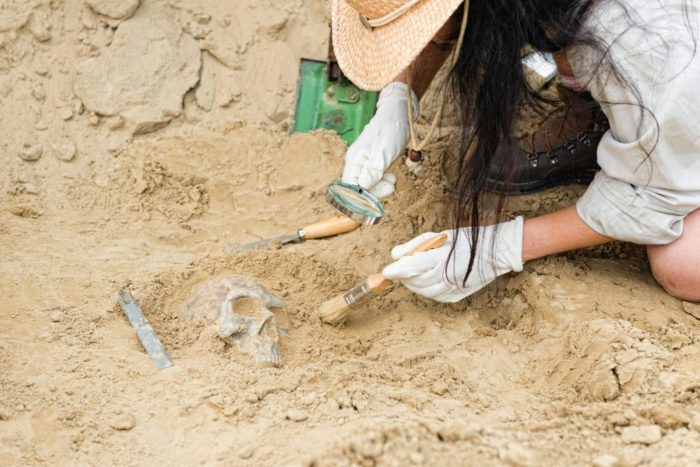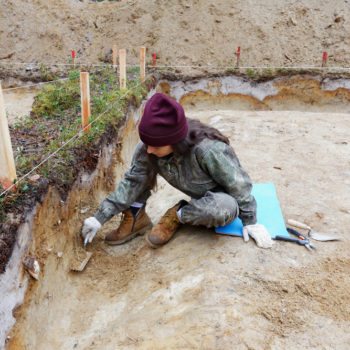Why We Love It
-
$64,290Potential Avg. Salary*
-
Growing DemandJob Outlook
* Salary & growth data is based on the recent Bureau of Labor and Statistics data published at https://www.bls.gov/oes/current/oes193091.htm for 19-3091 Anthropologists and archeologists 11/2021. Based on national data, not school-specific information. Conditions in your area may vary.
With a bachelor of science in anthropology, you’ll learn how to research and understand individuals and groups of different cultures and belief sets.
You’ll use the tools and techniques of historical investigation and psychology to understand why people are motivated to engage in certain distinct behaviors, activities, and traditions—with an emphasis on understanding rather than changing behaviors.
What is a Degree in Anthropology?
A bachelor of science in anthropology is a flexible degree that teaches students how to use research to understand problems and issues in society. Students study culture and human behavior using techniques rooted in historical, social, cultural, linguistic, and biological investigation.
You’ll learn how to apply these methods of investigation to better understand people from different cultures and belief sets, gathering data that are needed in a variety of industries, including business, law, education, and advocacy.
During your program, you may choose an area of focus and concentrate your studies on the people of a specific geographic region—Africa, Latin America, Oceania, Europe, North America, etc.
The study of anthropology is fascinating and leads to the growth of skills that are useful for careers both inside and outside of the field. Students learn how to collect data through observation, how to present the data collected in studies, how to thrive in diverse groups, and how to interpret texts thoughtfully.
Recommended Schools
What Courses Would I Take For a Major in Anthropology?
- Cultural Anthropology
- Human Behavioral Biology and Evolution
- Linguistics
- Archaeology
- Social Anthropology
- Ethnography
- Research and Statistics
- Language, Culture, and Communication
What Jobs Can You Get with a Degree in Anthropology?
The global economy is creating an increased demand for individuals who understand the norms and conventions of the people of different geographic areas.
As such, demand for individuals who can investigate the belief systems, traditions, and customs of different cultures is growing. Individuals with degrees in anthropology should be able to find work in a diverse set of industries, and use the skills they learned in college to build relationships with international clients, business partners, customers, and visitors.
How Long does it take?
A bachelors in Anthropology will have a typical length of 4 years in a full time schedule. That said, there are many ways to speed up the timeframe by either taking more units via online coursework, community college, or taking free classes at OnlineDegree.com that could transfer to universities in the US.
Online Anthropology Degree
There are several online anthropology academic programs available for students with flexible schedules. Students are required to complete 120 credit hours to earn their bachelor’s degree.
Since many fields of anthropology require practical experience, completely online anthropology programs are uncommon. Students are usually required to complete around 30 credit hours of their study on campus while the remaining can be completed online.
You can also earn an online master’s degree which requires completing around 35 credit hours but you also need to complete part of these courses on campus. Partial online doctoral anthropology programs are available but students. In such programs, students have to complete research work and publish their results and write a thesis.
What Can You Do With an Anthropology Degree?
Anthropology is a science that is considered to study human behavior and societies either in the past and the present. This science as it is currently known started in 1883 by Franz Boas who started field research among the Eskimo in Baffinland, Canada.
His studies argued against the racial discrimination theories which were commonly accepted at this time. It also led to doubts on the superiority of the Western civilization compared to other societies.
There are several branches of anthropology social-cultural anthropology, physical anthropology, archaeological anthropology, linguistic anthropology and applied anthropology.
Physical anthropology is the branch of anthropology that is closely related to biology. Anthropology also studies primates such as chimpanzees.
What does an anthropology student learn?
Students enrolled in anthropology educational programs focus on studying the behavior of humans as individuals, groups or societies. They also study the biological or neurological aspects of such behaviors as well as their motives. They also study the cultural, linguistic and behavioral differences between humans. The following are the main subjects studied in anthropology:
- The foundation courses to study anthropology vary according to the targeted specialization. In general, anthropology students should have good knowledge in math (particularly statistics), languages, social sciences, history and biology.
- General anthropology: introduction to anthropology as a science with its four branches. In this course, students start to recognize the differences between humans in the past and the present. Additionally, they will get an idea about the link between biology, culture and behavior.
- Cultural anthropology: studying the basis for the formation of the current cultures and how these cultures affect the behavior of individuals and societies. This course usually involves watching documentary movies and slides about various Western and non-western communities. Additionally, students may be required to conduct field interviews if diverse communities are available.
- Archaeology and Human Origins: digging into the pre-historic times to study the development of current cultures, communities and human beings in general. Students in this course get to know the principles of archeology and human biology.
- Biological anthropology: studying the biological aspects of human behavior which includes genetics, human fossils and human variations.
Studying anthropology will also include a number of more specialized courses that are required according to the major or the specialization that the student chose. Some of these are very unique to anthropology programs.
These courses include endangered and minority languages, ethnographic interviewing, field methods and research design, medical anthropology, human osteology and paleopathology, anthropology of death and dying, psychological anthropology, refugees/humanitarian response, human evolution and anthropology of violence.
Now I have an Anthropology Degree… where can I work after graduating?
The main advantage that anthropology students have compared to others is their acknowledgment of differences between people. They also understand more the motives and intents of people which is critically important in many settings. Accordingly, anthropology graduates are great candidates for a variety of important jobs.
- Scientific research: anthropology is a vast and important science. you may choose to work in the academic anthropology community generating studies that nearly affect every aspect of our world.
- Diversity officer
- Foreign Service officer as diplomats sent to represent their countries abroad. Studying the cultural differences between people is an important asset when representing your country to foreigners in a good way.
- Human resources representatives: Studying the behavior and cultural background of people is very useful in placing the right people in the right jobs or positions. You can also analyze the behavior and performance of the employees and take suitable corrective actions.
- Politics and public relations: studying the behavior of communities is essential to winning the political situation and deciding the correct way to serve the community.
- Media planner, marketing and social media specialist.
Should I Choose an Anthropology Degree?
If you feel interested in the cultures, religions and biology of humans then you should consider choosing an anthropology degree. You should also study anthropology if you have thoughts about the differences between communities, the reason for how people behave or the best way to lead people.
Anthropology is a very exciting study that is usually fascinating to the students. Anthropology includes studying all aspects of humanity at all times. Anthropology students have a good understanding of human behavior, relationships, motives and intents. They have good judgment regarding the surrounding people and acknowledge the differences between people.
Anthropology graduates understand the origin of beliefs, cultures and religions for people and accordingly, they are very skilled in leading groups and communities.
Moreover, studying anthropology helps in developing very important personal and mental skills:
- Critical thinking
- Analyzing unfamiliar information and data
- Problem-solving
- Flexibility to learn new skills and knowledge
- Improved communication skills particularly with diverse communities
- Students will also develop scientific skills as dating and determining the origin of artifacts, laboratory skills and evaluating genetic diversity over related species.
Recommended Schools
Best Jobs for Anthropology Degrees
While many anthropology graduates continue their studies, earning master’s and doctoral degrees to become anthropology professors and researchers, there are many opportunities available for those with only bachelor’s degrees.
Graduates go on to work as archaeologists, find jobs in museums and historical societies, help businesses grow globally, and advocate for human rights at government and nonprofit organizations.
How to save time and money
Our mission is to help you to avoid paying full price for college. We want your Anthropology degree to be affordable and accessible. Here’s how you could save:
Create Your Free SmartPlan

There are many ways to make college affordable and accessible.
That’s why we created a helpful tool called SmartPlan.
It’s free, and helps you find potential ways to save and tons of information about each school you’re considering
Think of it as your “college blueprint”, to help you instantly craft a path to your degree:
- Which Colleges Match Your Needs
- Ways You Could Save Time & Money
- Free Courses You Could Take for Credit
- Valuable Data and Insights on Each College
- Detailed Steps You Should Take!
See what’s possible for you and generate a free plan within just a few minutes
Create My SmartPlanYou Might also be Interested in
Many visitors who look for a degree in Anthropology are also interested in the following degrees.












